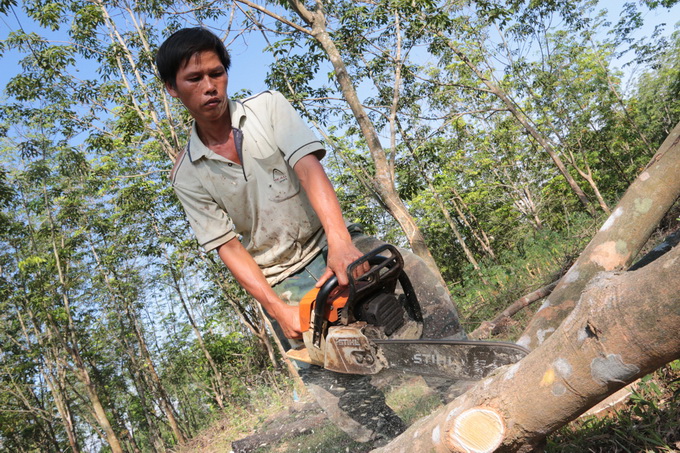Farmers in southern and central Vietnam are cutting down their rubber plantations en masse as latex prices have tumbled so sharply recently that revenues are not enough to cover expenses.
The deliberate destruction targets not only immature rubber plants, but also those which are producing latex, according to rubber growers, who will switch to cultivating annual plants in place of the downed rubber trees.
“While rubber latex prices were as high as VND30,000 – 40,000 (US$1.5-$2) a kg this time last year, the current rate is only VND15,000 a kg,” Ho Van Thanh, a farmer in the central province of Quang Tri, explained why he decided to empty his 1.5-hectare rubber plantation that was grown nearly 20 years ago.
Thanh could only rake in a few dozens of dong a day from the plantation, while it cost him VND200,000 ($10) to hire employees to get the latex, he said.
Rubber growers in several southern provinces, including Binh Duong, Binh Phuoc, Dong Nai, and Tay Ninh, too decided to give up on their plantations.
“We had to continue losing money on rising fertilizer prices and labor costs, while no one knew when latex prices would bounce back,” Vo Hung Lam said after chopping down his two-hectare plantation in Binh Duong.
Nguyen Thi Nga, a grower in Dong Nai, did not strike down her two-hectare plantation, but decided to leave it untouched, even though it is the season to harvest latex from the trees.
“Selling the latex is not enough to cover labor costs, so why should I do that?” she explained.
For Binh Phuoc-based Bui Van Rai, selling the plantation is a solution.
Rai had to borrow from different sources to afford VND1 billion ($47,170) to buy one hectare of immature rubber trees in 2010, but is now selling it at only half the investment.
But buyers are nowhere to be seen, he admitted.
Some growers in Tay Ninh, meanwhile, have downed the trees years before they are able to produce latex.
“I will have to spend dozens of millions of dong on the rubber trees in two to three years until harvest, but who knows prices will be high or low then?” Nguyen Van Chau, who has cleared his seven-hectare rubber plantation to give space to grow cassava, analyzed.
Reliance on Chinese market?
The fact that most of the private-run rubber companies are exporting their products to China across the border could be linked to the sharp drops of rubber latex prices, according to Nguyen Van Minh, director of Viet Trung Co Ltd, a rubber firm based in central Quang Binh Province.
“Like other companies in the central region, all of our rubber latex is sold to Chinese partners via the border, and the prices are determined by them,” Minh said.
Minh added it was a tough problem for them to officially export the products to other markets due to the instable supply and poor financial ability.
A business must have at least 1,000 tons of latex in stock to export, but monthly supply is not enough to cover that amount, Minh said.
“We will not have enough money to pay for operation costs if we wait to collect enough stockpiles, so we have to export via the border,” he concluded.
























































